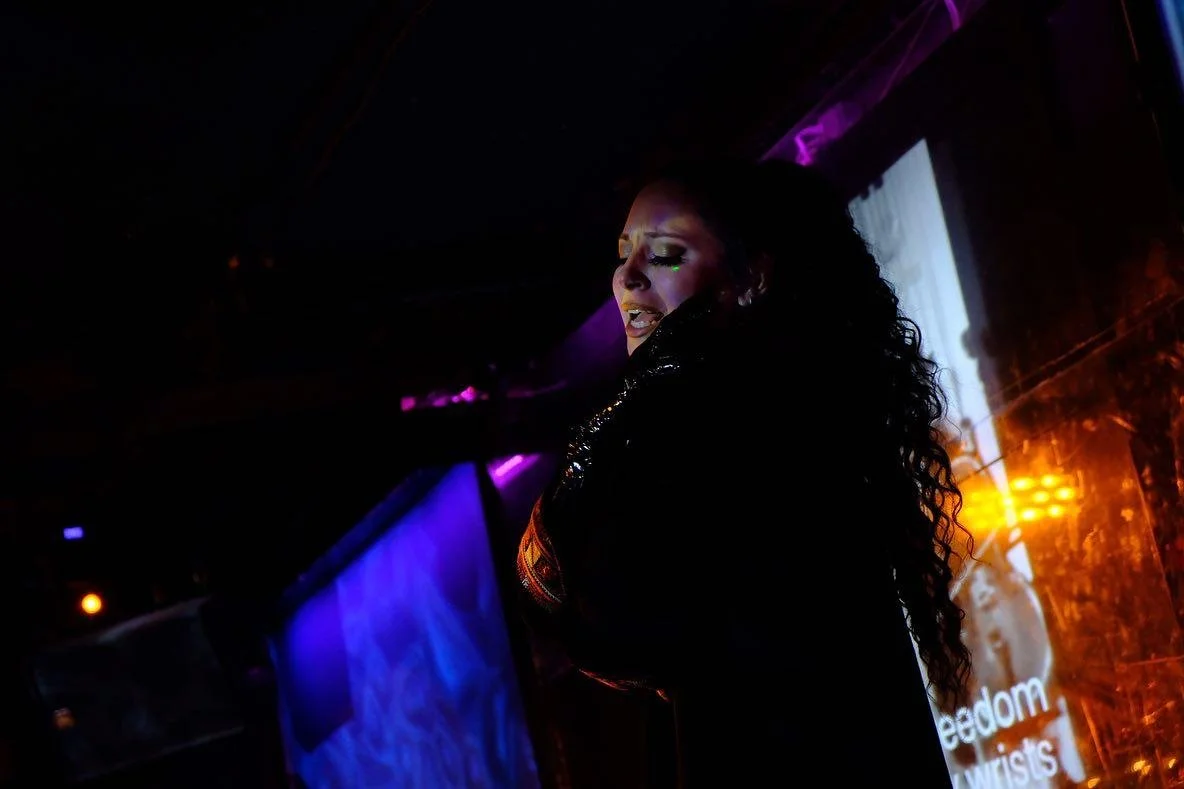‘Palestinian, Queer, and Hungry’: An Interview With Burlesque Dancer Leila Delicious
Staff Writer
“From the river to the sea Palestine will be free…”
Leila held the eyes of her audience as she slowly moved her hands over her traditional Palestinian wear. Then, the mournful music and voiceover changed as she began to pour olive oil over her body. This was burlesque like you had never seen it before - queer, daring, and full of Palestinian joy.
Last year, Philadelphia-based performer Leila Delicious — who opted to use her stage name for this interview — put togetherEat Me Baladi, an hour-long show, with fellow Palestinian performance artist Loulou. But for Leila, burlesque wasn’t part of her original life plans.
“I moved to Philadelphia because of the arts scene,” Leila told Al-Bustan, “I studied performance art in college, so that was the world I found myself in here.” Leila attended her first burlesque show two years ago — but she was immediately hooked, saying, “I was like, ‘This is a space I need to be in,’ especially because I couldn’t see anyone like me in burlesque spaces.”
“I definitely didn’t think this would become such a big part of my life,” she continues, “but now here we are talking because you reached out to me!”
Although Leila only began burlesque a year and a half ago, she has found herself enmeshed in a community where people are “constantly booking each other and befriending each other.” She notes, “What I love about burlesque circles in Philly is if you’re part of them for a year, you’ll know everyone by the end of the year.” It’s a big contrast to other cities like New York where, Leila says, “You have to really make a name for yourself before people know you”.
For Pride, Al-Bustan connected with Leila to learn more about how she connects with burlesque as a form of social expression for Palestinian queerness. (This interview has been edited and condensed for clarity and length.)
Al-Bustan How have you felt about the performance art community in Philadelphia?
Leila: The performance arts scene, compared to the burlesque scene, is pretty diverse in the sense that you can find a pretty wide range of people doing a variety of different forms. Now I’m super excited to be the person who people come to when they’re asking about SWANA burlesque. Obviously it’s a lot of pressure and I try to remind myself and other people that I do not represent queer SWANA people, I represent myself. I have to be like, “How I connect my sexuality and my culture is unique, don’t expect other people to feel the same way.”
My performance art brain asks: What does it mean for a Palestinian to be indulgent and taking up so much space?
Do you feel like you’re putting traditional Palestinian dance forms in conversation with burlesque, or more that you’re expressing your own identity in burlesque form?
Leila: So far more of the latter - I haven’t used elements of e.g. debke in my performances but my performances are very much how I view my identity and my culture and my diaspora. One thing that’s important is the issue of exoticization. It’s something you have to constantly navigate as a SWANA performance artist regardless of sexual content - where it’s like “I am sensing myself and tapping into my body and my sensual experience on my own terms”, versus what the audience is expecting of me and my culture. Anytime I make anything, I have to think about that a hundred thousand times - how much information does the audience have about Palestine, what are they expecting to see, how much of that do I want to give them, do I want to fuck with that, or do I want to play into that? So those are constant negotiations I have to make and questions I have to ask myself. My performance art brain asks: What does it mean for a Palestinian to be indulgent and taking up so much space?
Has burlesque been a healing space for you from previous performance art spaces?
Leila: I was lucky to be in very progressive performing arts spaces that considered all movement to be dance. But burlesque was an invitation for me to add my sexual identity to what I was already making, which was very ancestry-based and inspired by my Palestinian grandparents. I loved that work but sharing it made me feel like I was negating a very specific part of my identity, my truth, and my family’s truth because one aspect could not be included in certain SWANA spaces. Burlesque is the only time I’ve been able to show my whole self, be a goof, and eat indulgently on stage.
Without burlesque I wouldn’t have become so secure in who I am. Burlesque has so much to offer folks in minority groups, survivors of sexual assault, people who have been taught to hate their bodies, and really just anyone who has been taught to not take up space. The fact that you’re being asked to take up all the space in the room and fill up every corner and look people in the eyes - it’s somatically experiencing the opposite of what you have been forced to do, and there’s only so many times you do it before you physically believe it. Bringing that Palestinian joy is what I prioritize every time I go on stage. People might think my burlesque does too much, but it’s very authentic for me to be Palestinian, and queer, and hungry, and covered in rhinestones!



